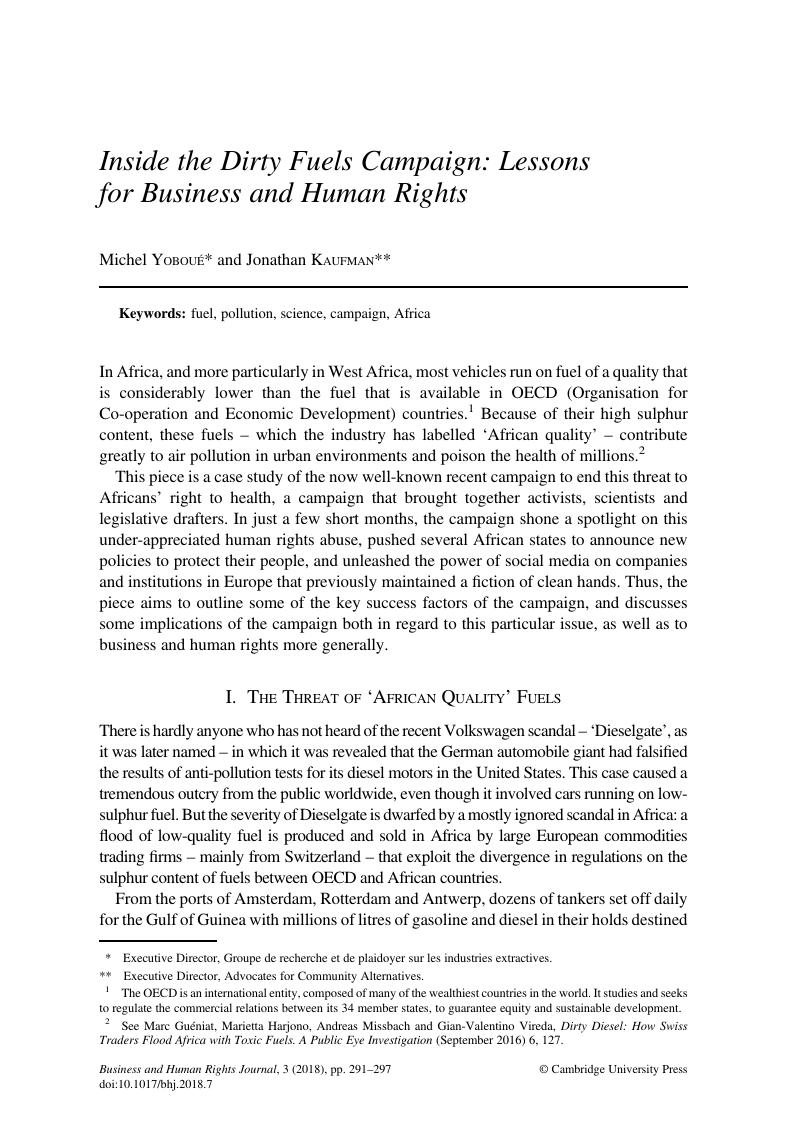Article contents
Inside the Dirty Fuels Campaign: Lessons for Business and Human Rights
Published online by Cambridge University Press: 06 July 2018
Abstract

- Type
- Developments in the Field
- Information
- Copyright
- © Cambridge University Press
Footnotes
Executive Director, Groupe de recherche et de plaidoyer sur les industries extractives.
Executive Director, Advocates for Community Alternatives.
References
1 The OECD is an international entity, composed of many of the wealthiest countries in the world. It studies and seeks to regulate the commercial relations between its 34 member states, to guarantee equity and sustainable development.
2 See Marc Guéniat, Marietta Harjono, Andreas Missbach and Gian-Valentino Vireda, Dirty Diesel: How Swiss Traders Flood Africa with Toxic Fuels. A Public Eye Investigation (September 2016) 6, 127.
3 Public Eye is an independent Swiss NGO that has been committed for more than 40 years to just and equitable relations between Switzerland and the developing world. It speaks out against irresponsible activities of companies headquartered in Switzerland and takes action to make political and economic decision makers take seriously their social and environmental responsibilities.
4 See Libby George, ‘Africans Choking on Toxic Fuel in Health “Ticking Time Bomb”: Lobby Group’, Reuters (16 September 2016), https://www.reuters.com/article/us-fuels-pollution-africa/africans-choking-on-toxic-fuel-in-health-ticking-time-bomb-lobby-group-idUSKCN11M1A4 (accessed 4 May 2018).
5 ICF International, Final Report: Sub-Saharan Africa Refinery Project, Vol. II-A: Refinery Study (July 2009), 119–20.
6 See, e.g., Alice Ross, ‘Five West African Countries Ban “Dirty Diesel” from Europe’, The Guardian (6 December 2016), https://www.theguardian.com/global-development/2016/dec/06/five-west-african-countries-ban-dirty-diesel-from-europe-nigeria-ghana (accessed 4 May 2018).
7 Alexis Adélé and Mélanie Gonzalez, ‘Trafic de Carburants Toxiques en Afrique: une Association Porte Plainte au Sénégal’, Le Monde (29 September 2016), http://www.lemonde.fr/afrique/article/2016/09/29/carburants-toxiques-depot-de-plainte-au-senegal_5005447_3212.html#6IERCsIoO1brsiQX.99 (accessed 4 May 2018).
8 ‘African Refiners Move on Specs after Criticism’, Argus Media (14 March 2017), http://www.argusmedia.com/news/article/?id=1422333 (accessed 4 May 2018).
9 Federal Council, ‘Carburants Toxique Vendus Aux Pays Africains’, Heure des Questions (26 September 2016), https://www.parlament.ch/en/ratsbetrieb/suche-curia-vista/geschaeft?AffairId=20165419 (accessed 4 May 2018).
10 See United Nations Office of the High Commissioner for Human Rights, Comment on Social, Economic, and Cultural Rights, ‘General Comment No. 14: Right to the Highest Attainable Standard of Health (Art. 12)’, E/C.12/12/2000/4 (11 August 2000), para 36.
11 Declaration of Alma-Ata (International Conference on Primary Health Care, Alma-Ata, 6–12 September 1978), art II.
12 United Nations Office of the High Commissioner for Human Rights, CESCR General Comment 14, note 10, para 39.
13 See Center for International Environmental Law, ‘Are Belgium and the Netherlands in Breach of their International Obligations under the Basel Convention and Customary International Law due to their Export of High Sulfur Fuels to Certain Developing Countries in Africa that are Parties of the Bamako Convention?’ CIEL Legal Opinion (23 January 2017), http://www.ciel.org/wp-content/uploads/2017/02/High-sulfur-fuels_CIEL-legal-opinion-23_01_2017-.pdf (accessed 4 May 2018).
14 Ibid.
- 3
- Cited by


